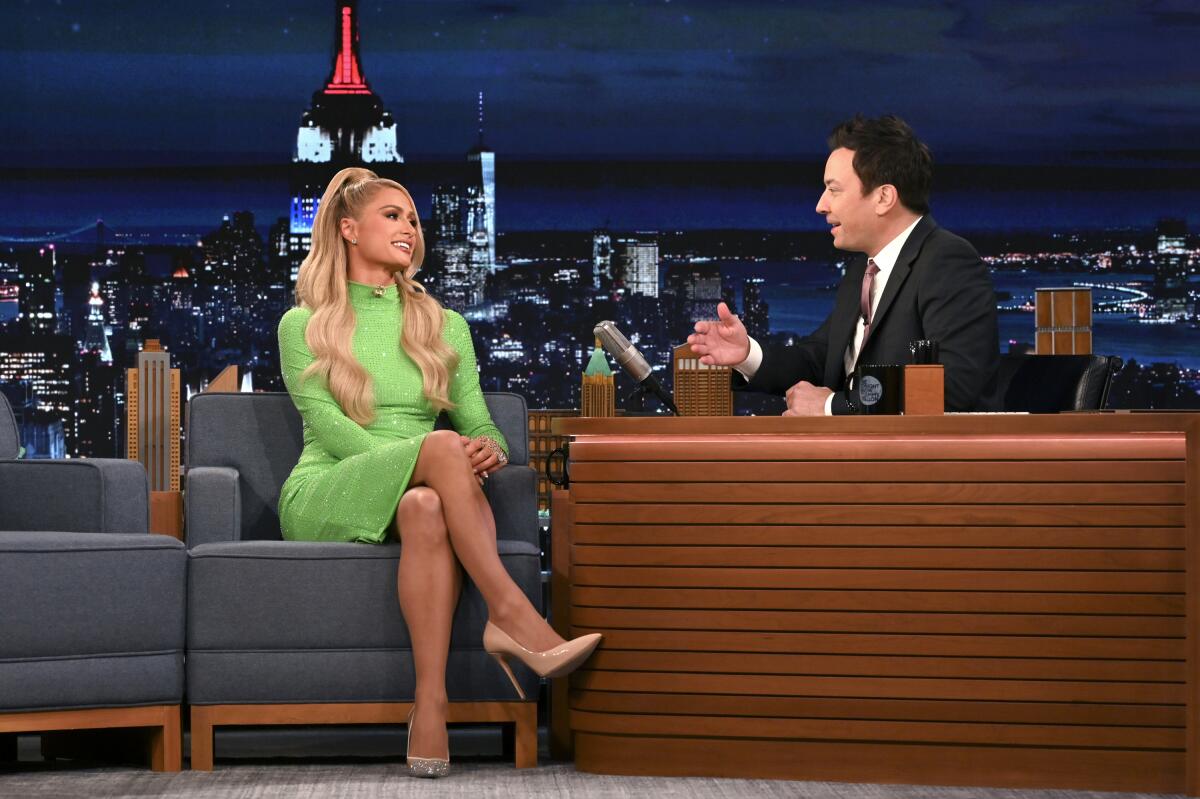Jimmy Fallon hyped his Bored Ape NFTs on âThe Tonight Show.â Conflict of interest?

From actors to athletes to influencers, celebrities canât seem to stop talking about their enthusiasm for all things crypto. Never one to sit out a trend, on Monday, âThe Tonight Showâ host Jimmy Fallon was eager to show off his acquisition of a pricey digital collectible â even if it meant flouting an ethics policy that governs most NBCUniversal employees.
âThis is my ape,â the late-night comedian told his audience during an interview with Paris Hilton, flashing a picture of a sailor cap-wearing cartoon monkey. âIt reminded me of me.â
The monkey is one of 10,000 from the Bored Ape Yacht Club collection of nonfungible tokens, or NFTs. Hilton showed her own Bored Ape, and later gave audience members free NFTs from her own collection. âWeâre part of the same community,â Fallon told her.
Digital sleuths have deduced that Fallon probably purchased the primate pic last November for about $216,000 (or rather, purchased a record on a digital blockchain ledger saying he owns it). Hyping it up on his show may well boost its asking price even higher if he ever tries to resell it â which is where things get tricky.
A workplace policy set out by Comcast, the parent company of âThe Tonight Showâ network NBC, asks employees to ânot let outside interests or activities interfere with [their] business judgment or responsibilities to the company.â
Another policy within NBCUniversal mandates that all employees âdisclose and obtain approval for all outside work, financial interests and other personal activities/relationships that may create or appear to create a conflict.â The same policy says that employees should not âuse company info, resources, time, etc. for personal benefit.â
If Fallonâs use of show time to flex his ape were to boost its resale value, it would seemingly be a case of using company resources for personal benefit.
An NBC spokesperson said that Fallon did not violate the companyâs conflict of interest policy, noting that hosts are able to promote outside projects such as books and movies.
Nonfungible tokens are the latest trend for people trying to get rich, and theyâre more than just a place to park money. Plus: an update on last weekâs episode âOur nationâs Haitian double standard.â
But those are creative endeavors that in turn serve to promote NBCâs programming, whereas an NFT is a financial asset in a class where value is closely tied to virality and influencer adoption.
Charles Davis, dean of the Henry W. Grady College of Journalism and Mass Communication at the University of Georgia, said that he was âunsure whether [an entertainer] sharing the NFTs they purchased equals a plea for others to buy.â
âThat would seem a line of sorts, if they were to market them on set,â he wrote in an email. But with Fallon, âit seems to be less shilling and more just sharing a purchase.â
Don Heider, executive director of the Markkula Center for Applied Ethics at Santa Clara University and a former television journalist, said that people with as much âpower and influenceâ as Fallon âneed to be thoughtful about what theyâre doing and why theyâre doing itâ when they blur the lines between commercial versus editorial content.
Financial reporters at the Wall Street Journal or Bloomberg, for instance, âfollow a fairly strict code of ethics in terms of not owning stocks that they cover,â Heider added. âIs it a good idea, is it ethical, is it in the public interest, to be endorsing something on air â whether youâre a reporter, whether youâre an entertainer, anything else â that you have an investment in?â
Although the Securities and Exchange Commission is now indicating that it may soon regulate the crypto space more aggressively, thereâs currently scarce oversight of NFTs and other parts of the so-called Web 3.0 economy â especially as compared with more traditional fiscal assets.
âWe have very strict standards for how people can talk about stocks, and insider trading, and those rules have not been applied to this area yet,â Heider said. âItâs kind of the Wild West still.â
The space is also awash in scams, theft and, allegedly, money laundering. Cryptocurrency prices have crashed recently, and critics have warned that the nominally decentralized ecosystem is, in fact, quite centralized.
Yet none of that has stopped the sector from raking in impressive sales. An NFT by the artist Beeple sold for $69 million last March, and the Bored Ape collection has reportedly generated more than $1 billion in net sales.
âI donât love the idea of luring people in, thinking theyâre gonna get wealthy off of trading NFTs,â actor Ben McKenzie said. The former star of âThe O.C.â and âGothamâ has recently been campaigning against aspects of the celebrity-endorsed crypto economy.
McKenzie noted that plugging stuff is what talk shows are for, but said the addition of financial speculation on top of that concerns him.
âIf everything were transparent, then I think that might be one thing,â McKenzie said. âBut given how opaque these markets are, and how easily they can be manipulated â through means that would be illegal in regulated markets â Iâm not wild about it. And Iâm not wild about, quite frankly, Jimmy Fallon using his show to promote it.â
âI donât think thereâs any negative intent by him,â he added. âBut in times of a bubble, like the one that weâre in ⌠speculation runs rampant. And people unfortunately, historically speaking, they end up spending money that they think they have. ⌠Eventually, the tide goes out.â








